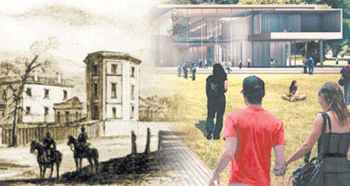 Editor’s note: Once again, publisher Bill Bowman relinquishes his space to accommodate an article on a timely issue — The North Carolina Civil War & Reconstruction History Center. Sharing relevant information on important topics is what Up & Coming Weekly is all about.
Editor’s note: Once again, publisher Bill Bowman relinquishes his space to accommodate an article on a timely issue — The North Carolina Civil War & Reconstruction History Center. Sharing relevant information on important topics is what Up & Coming Weekly is all about.
Projects, both public and private, begin as a little kernel of an idea in someone’s mind and chug along for days, weeks, months and years before taking on lives of their own, if they ever do. When that someone shares an idea with others, they will either get on the bandwagon or see enough flaws to shoot down that idea. Development is always a journey.
What we now know is the North Carolina Civil War & Reconstruction History Center has been germinating since the late 2000s. It began with supporters of the Museum of the Cape Fear, who realized that the regional museum concept was not cohesive enough to create a booming and sustainable state museum and began looking for a bigger idea. A professional consultant was brought in and pointed out the obvious.
The United States Arsenal, built on Haymount hill in Fayetteville in 1838 and handed over to Confederate rebels in 1861, brought Union Gen. William Tecumseh Sherman to our city to destroy the Arsenal in March 1865, and destroy it he did. Sherman’s 62,000 Union troops and 25,000 camp followers swept into what was then a hamlet of 4,000-5,000 souls and swept out three woeful days later, leaving little but rubble on the Arsenal site. Sherman continued north into Virginia, and the Civil War was over within six weeks.
What happened in our community, and its aftermath, helped end the deadliest and arguably the most painful period and armed conflict in our nation’s history. Why not focus a comprehensive state institution on what happened to the people of North Carolina before, during and after the American Civil War?
By 2010, that idea had become a twinkle in the eyes of residents and museum supporters, including nationally known historian Mary Lynn Bryan and then-State Sen. Tony Rand. They enlisted others, like former Fayetteville Observer publisher Charles Broadwell, local businessman and community activist Mac Healy, and this Up & Coming Weekly columnist, forming a nonprofit foundation to explore and develop this idea.
Over this decade, support grew, and the foundation raised money to hire an architect to design an appropriate building, engaged a nationally known exhibit design firm to develop modern exhibits and collaborated with scholars and historians to develop a narrative of stories of North Carolinians — black and white, Union and Confederate.
Also, the North Carolina Department of Public Instruction is working with the History Center to allow fourth-, eighthand 11th-grade students studying North Carolina history online access to History Center resources. The idea is to tell real stories, at least one from each of our 100 counties, rather than displaying weapons and battle flags.
Along the way, the NCCWRHC garnered an advisory board, co-chaired by former governors Jim Hunt and Jim Martin, raised $7 million from private sources and an additional $5 million grant from the state of North Carolina. It has also received $15 million in financial pledges from the city of Fayetteville and Cumberland County, as well as funding from the North Carolina General Assembly. History buffs from across our state and beyond are looking forward to this one-of-a-kind resource as part of our state museum system.
All of this has happened since that kernel sprouted in local minds and hearts. The NCCWRHC has been researched and thought through at every stage of development and has the best organization, design and scholarship available behind it. The History Center is now poised to become reality.
Why should you care about this when our community and our state have so many divergent and pressing issues facing us?
Fayetteville and Cumberland County should care for a practical reason. A facility of this magnitude is an economic development project, bringing both visitors and resources to our community for the foreseeable future. Once operational, the History Center will be operated by the state, not by local government.
Less tangibly and perhaps more importantly, the History Center is an opportunity for North Carolinians and all Americans to understand the issues of our past, how those issues continue to plague us today, and how they may compromise our future if we cannot resolve them as a nation.
Writer and philosopher George Santayana put it this way. “Those who cannot remember history are doomed to repeat it.”

 How to resolve AdBlock issue?
How to resolve AdBlock issue? 








